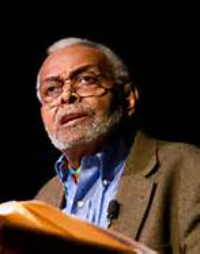 We received the heartbreaking news today that we've lost a giant. Amiri Baraka whose government name was Everett LeRoi Jones a native of Newark, New Jersey died today at the age of 79. After developing an interest in poetry and jazz in high school, Baraka attended Howard University, where he changed his name to LeRoi James. He earned his degree in English in 1954, and then joined the United States Air Force. After three years of service, Baraka received a dishonorable discharge for owning inappropriate texts.
We received the heartbreaking news today that we've lost a giant. Amiri Baraka whose government name was Everett LeRoi Jones a native of Newark, New Jersey died today at the age of 79. After developing an interest in poetry and jazz in high school, Baraka attended Howard University, where he changed his name to LeRoi James. He earned his degree in English in 1954, and then joined the United States Air Force. After three years of service, Baraka received a dishonorable discharge for owning inappropriate texts.
In 1965, he became involved in the Black Nationalist poetry and literature scenes. Baraka then moved to Manhattan, where, in addition to attending Columbia University and The New School, he became a prominent artist in the Greenwich Village scene and befriended Beat poets such as Allen Ginsberg and Jack Kerouac. He published their and other poets' work in the newly founded Totem Press.
In 1961, Baraka published his first major collection of poetry, Preface to a Twenty Volume Suicide Note. His 1964 play, The Dutchman, which addressed racial tensions and American blacks' repressed hostility toward whites, gained him fame and acclaim.
 After a trip to Cuba, Baraka disassociated with the apolitical Beat movement in favor of addressing racial politics. The assassination of Malcolm X was a turning point in his life. Afterward, he disavowed his old life, including his marriage to Hettie Cohen and changed his name to Amiri Baraka. He became a black nationalist, moved to Harlem and founded the Black Arts Repertory Theatre/School. The company dissolved after a few months, however, and Bakara moved back to Newark and founded the Spirit House Players.
After a trip to Cuba, Baraka disassociated with the apolitical Beat movement in favor of addressing racial politics. The assassination of Malcolm X was a turning point in his life. Afterward, he disavowed his old life, including his marriage to Hettie Cohen and changed his name to Amiri Baraka. He became a black nationalist, moved to Harlem and founded the Black Arts Repertory Theatre/School. The company dissolved after a few months, however, and Bakara moved back to Newark and founded the Spirit House Players.
Baraka fully immersed himself in Newark, becoming a leader of the city's African-American community. In 1968, Baraka became a Muslim and added the prefix Imamu, meaning "spiritual leader," to his name. In 1974, however, he dropped the prefix, identifying as a Marxist.
Baraka is known for his aggressive, incendiary style. His writing is controversial and has often polarized readers. His poem "Somebody Blew up America," a response to the attacks against the United States on September 11, 2001, was criticized for being anti-Semitic. His position as New Jersey's poet laureate was stripped as a result of public outcry against the poem.
 A prolific writer, Baraka has penned more than 50 books, including fiction, music criticism, essays, short stories, poetry and plays. In 1984, he published The Autobiography of LeRoi Jones/Amiri Baraka. He's taught at many universities, including the New School for Social Research, San Francisco State University and Yale University. Before retirement, he served as professor emeritus of Africana Studies at the State University of New York at Stony Brook for 20 years. Baraka lives in Newark, New Jersey, with his wife, Amina.
A prolific writer, Baraka has penned more than 50 books, including fiction, music criticism, essays, short stories, poetry and plays. In 1984, he published The Autobiography of LeRoi Jones/Amiri Baraka. He's taught at many universities, including the New School for Social Research, San Francisco State University and Yale University. Before retirement, he served as professor emeritus of Africana Studies at the State University of New York at Stony Brook for 20 years. Baraka lives in Newark, New Jersey, with his wife, Amina.
It is said that we are judged by the work we do - Dear Brother your work speaks for you. Thank you for your commitment in the struggle. Your voice for the voiceless, even if they could not understand your words; you voice was heard and you will be sorely missed. And that’s my thought provoking perspective…










No comments:
Post a Comment